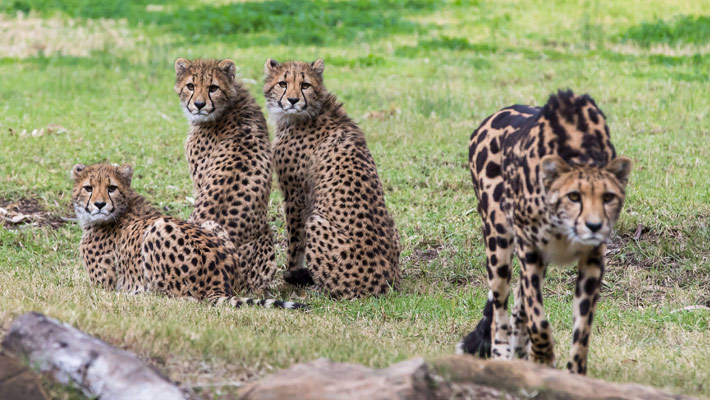What's for lunch?
The Cheetah is carnivorous. Its diet consists primarily of mid-sized ungulates, especially gazelles. Other prey include Impalas, ground-dwelling birds and small mammals, such as rabbits.
Cheetahs hunt in the early morning and late afternoon, scanning the countryside from high places such as a tree limb or the top of a termite mound. Once they have located an animal the Cheetah tries to get within fifty yards of the intended victim before accelerating.
Lightning fast
The Cheetah runs up to 103km per hour (29 metres per second) in high speed chases over distances of hundreds of metres. Full sprints only last on average twenty seconds, rarely exceeding one minute.
Sing for your dinner
Cheetahs, unlike other African predators, rarely scavenge and do not remain long with their kills, many of which are stolen by other carnivores. Cheetahs are primarily active during the day, unlike other predators, a strategy that may help to reduce competition. They eat their kill fast, because if they are challenged for their food by another predator, they will usually lose.
Socialising
Cheetahs have a social organisation that is unique among the felids. Females are solitary or accompanied by dependent young, and males are either solitary or live in stable coalitions of two or three. Some coalitions consist of brothers, but unrelated males may also be members of the group. Unlike the coalitions formed by male lions, which remain attached to, and mate with, the females in a single pride, male Cheetah coalitions mate with as many females as possible, and females show no mate fidelity.

Come and meet us
You can meet our Cheetah family at Taronga Western Plains Zoo Dubbo.
Taronga Western Plains Zoo Dubbo was the first zoo in Australasia to successfully breed cheetahs. Taronga supports Cheetah Conservation with the Cheetah Conservation Botswana (CCB), who conduct youth and adult education activities in remote rural areas where human-wildlife conflict is rife. Taronga is supporting CCB in their engagement and educational work with the aim of developing the next generation of wildlife ambassadors who can influence their communities and peers to engage in proactive conservation behaviours.